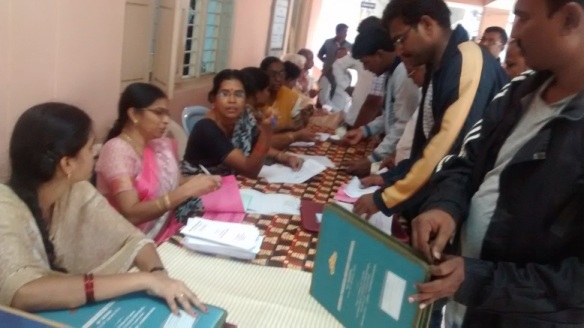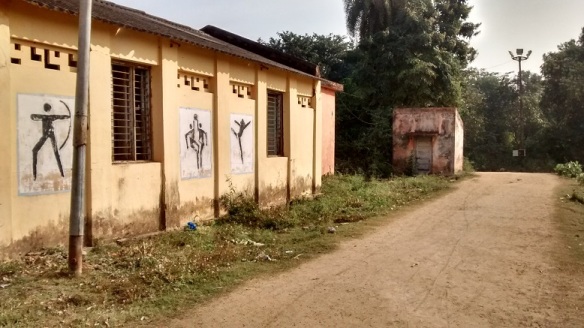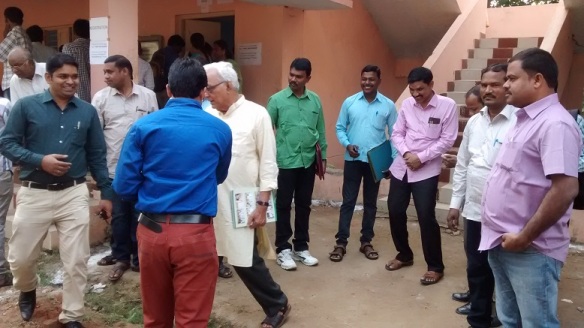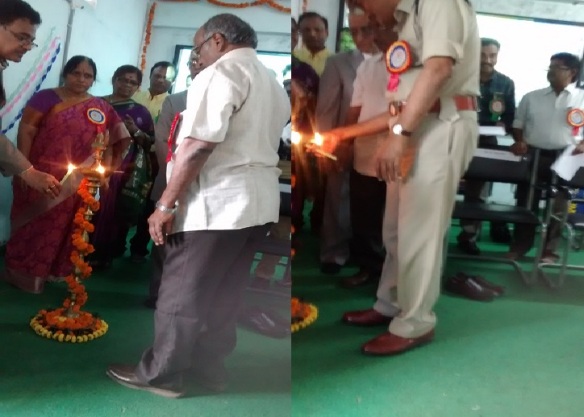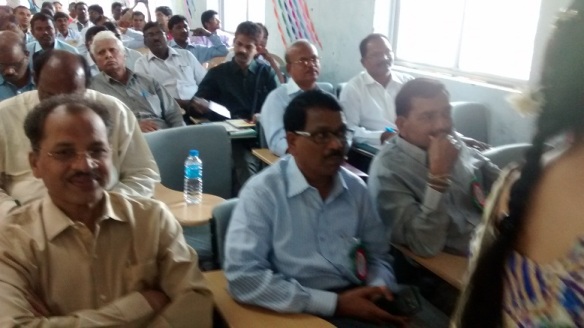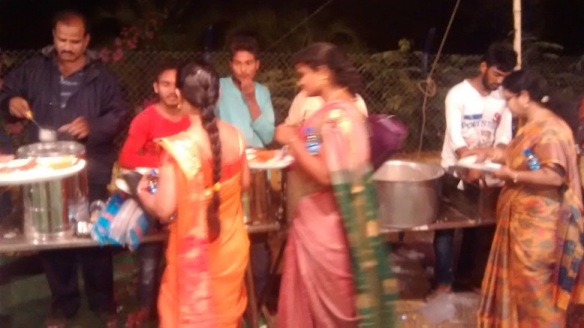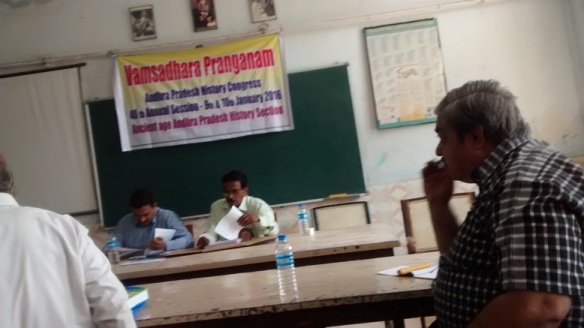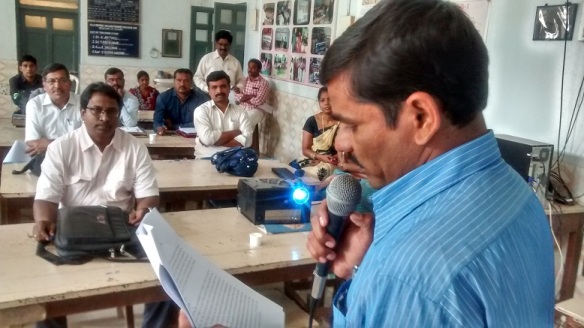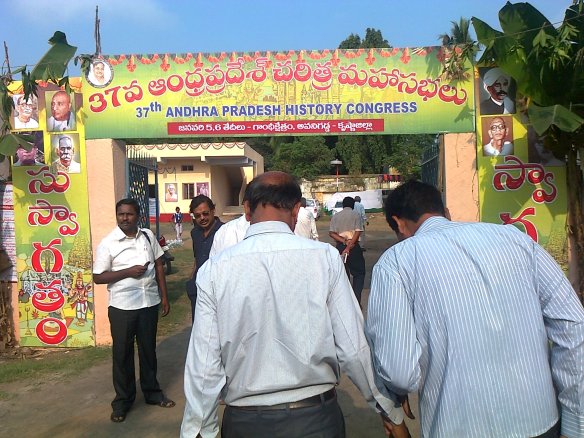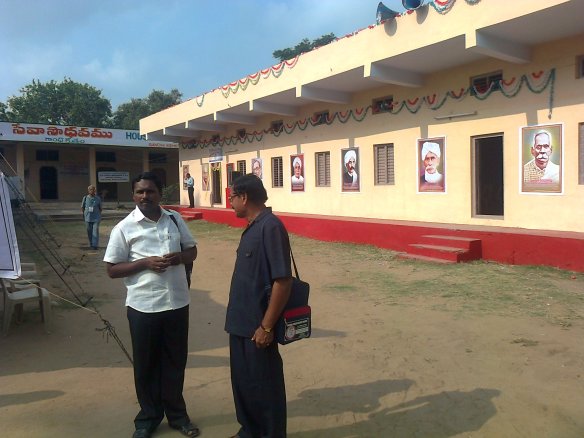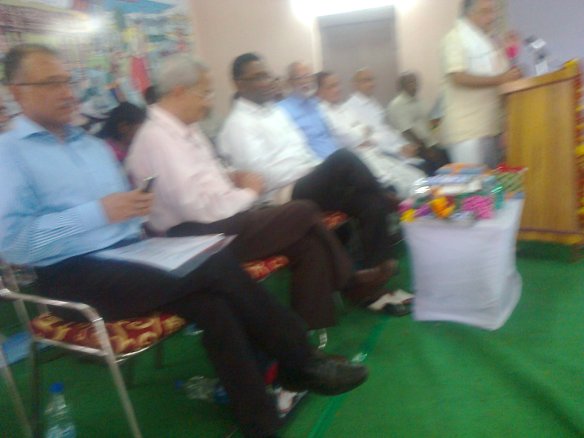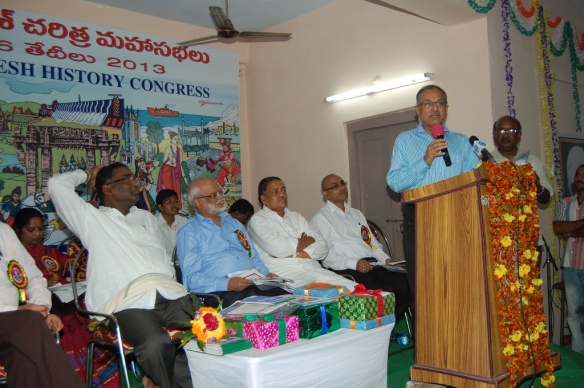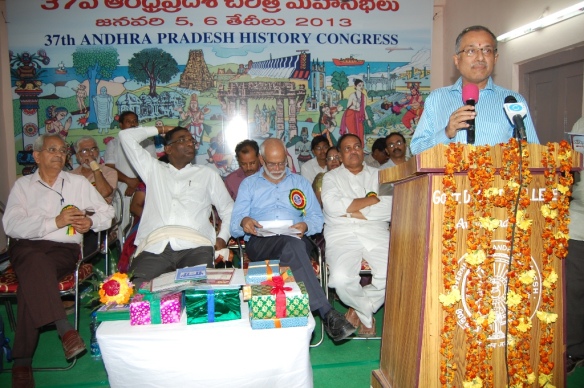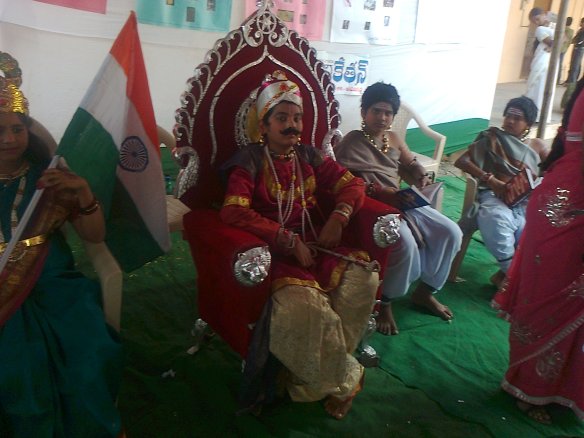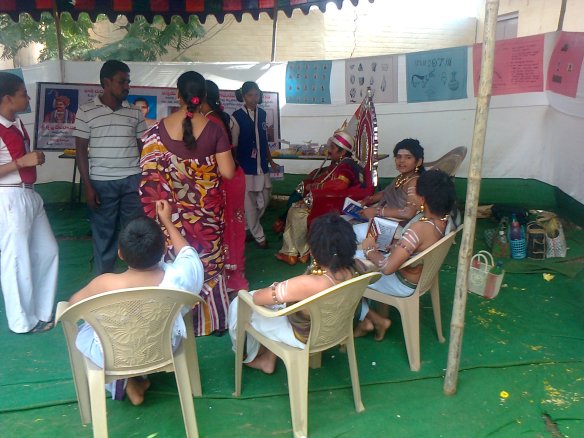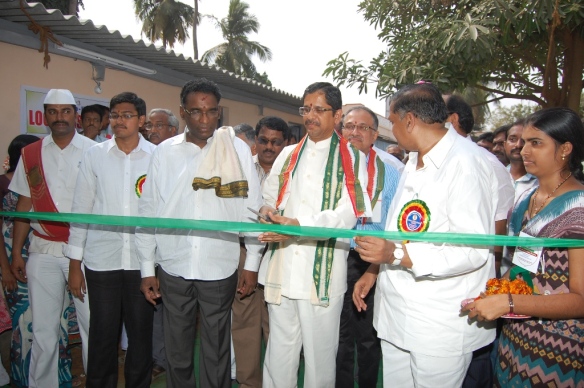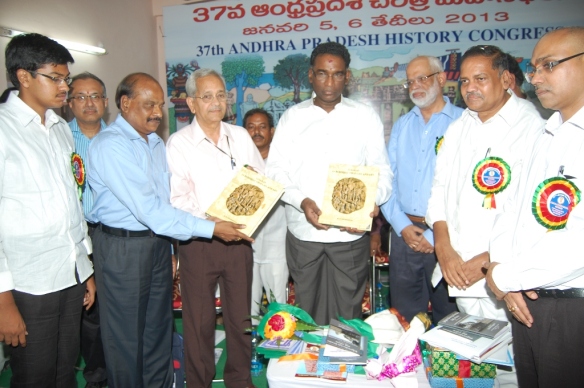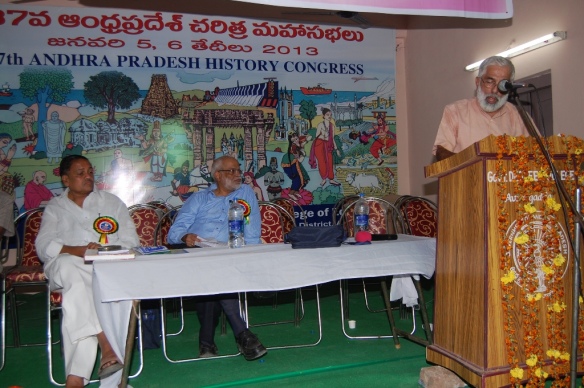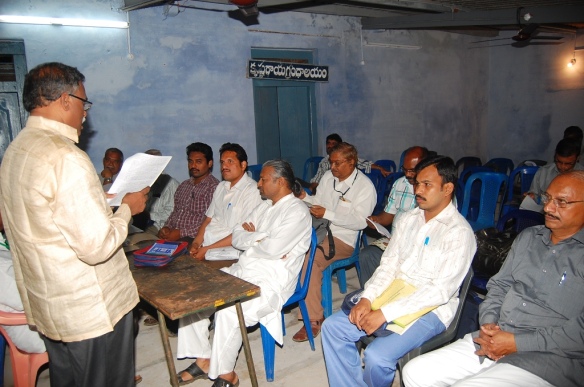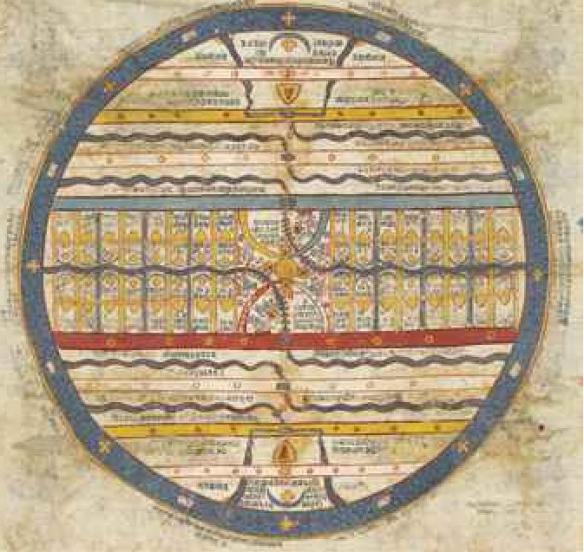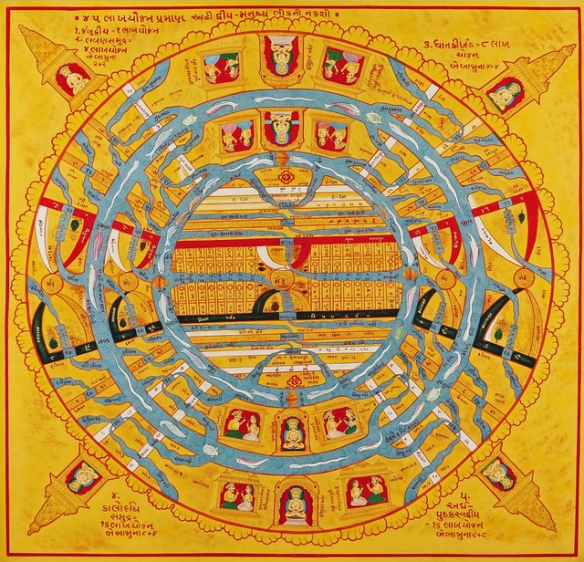The Proceedings of 40th session of Andhra Pradesh History Congress held at Srikakulam on January 9th and 19th, 2016

1. Delegates taken to the venue by a POLICE bus
The Andhra Pradesh History Congress [ఆంధ్ర ప్రదేశ్ చరిత్ర కాంగ్రెస్, శ్రీకాకుళం, (hereinafter mentioned as APHC)] held its 40th session at the Government College for women at Srikakulam on Saturday (09-01-2015) and Sunday (10-01-2016). The General Secretary’s first circular dated 17-11-2016 (sic)[1] and the local secretary’s circular dated NIL gave the usual details about the delegate fees, accommodation, paper reading etc. About 70 delegates reached Srikakulam on 8th evening and they were first taken to the college, got registered and accommodated according to their “status”, though the delegate fees of Rs. 400/- was same and all have been members of the association. As for as we (a group of 10 delegates) were concerned, we were taken by a “POLICE” bus at one circle and asked to get down.

2. Govt women college entrance, Srikakulam
Delegates getting down from bus and going for registration.

4. The places of registration on LHS and seminar hall on RHS, where inaugural and valedictory sessions were held.
The memorial lecture and cultural program were held at the seminar hall upstairs.
The registration was done and the folder was given, however, ii did not contain the list of papers and paper presenters or abstract.
The annual and life memberships were checked, fees collected.
Now they appeared to have been free!
The college building looked old and the surroundings were with grown shrubs.
College view backside, a room in dilapidated condition.
Exploring and discovering “Balaji Lodge”: One Sri Ranga Rao got down first and making some enquiries about the location of “Balaji Lodge”. First, he took us to one old “Balaji Lodge” and the delegates who accompanied expressed their dissatisfaction about the condition. So he took us to another “Balaji Lodge” situated half-a-km away by walk with all our luggage. The person at the reception refused to give any room, unless amount was paid in advance. Ranga Rao was telling that “Madam”[2] had already informed about the accommodation. He said no, and repeated his demand of advance. Meanwhile, the same delegates who expressed their dissatisfaction about the old “Balaji Lodge” wanted to verify the condition of the rooms, as the reception itself was awkward with dust and garbage and the chairs were with 2 mm dust settled down! They returned to inform that the rooms were dirty and therefore, they did not want to stay there. Ranga Rao was again talking with somebody or “Madam” informing what was happening. Then he asked us to come to another “Balaji Lodge” situated half-an-km. Now, I told him I could not walk like this with luggage and asked him as to to whether knew the location of the lodge or not. He assured that he was taking to the right “Balaji Lodge” now! I was walking slowly behind them and at last we reached yet another “Balaji Lodge”! Actually, Ranga Rao did not know the location of real “Balaji Lodge” or he tried to put us in some “Balaji Lodge”, was not known, but, being a local person, that too, the “preparation and arrangements” were going for the last three months, it was intriguing that he should have made us to roam in different lanes here and there with luggage and finally discover the real “Balaji Lodge” on the main road, G. T. Road, next to Andhra Bank. Now, the person at the reception agreed to provide rooms. So about 10 delegates were accommodated there. I requested for ground floor, but, he told only single rooms were available and therefore, he could give a room in the first floor. So we settled at room no.204 and my roommate was Dr A. Madhusudhana Rao, HOD, History Department, Tirupati[3].

Rama lodge, where delegates were accommodated
Egalitarianism and utopian principles would not work among the “historians”: Later, I came to know that delegates of different categories Elite, eminent, emeritus, VIP etc., had been accommodated at N. S. Residency, Arsavalli, Police Guest House, Rama Lodge, Varam etc. So the Communist, Marxist and other hypotheses of utopian or egalitarianism would not work here and none could tallk about equity, equality or impartiality, suppression, oppression and exploitation of one group by other dominant group or another principle or ideology. Division, differentiation and discrimination have to be there to prove their position, condition and status, so this type of “caste system” or “Varnasgrama dharma” has been there and we may have to find a “Manu” to burn his “sastras” Even among the “historians”, there has been grudge about their treatment, as I have been watching such trends closely since 1985, being a life member of Indian History Congress, South Indian History Congress, Andhrapradesh History Congress, Tamilnadu History Congress, All India Oriental Congress, Mythic Society, Institution of Engineers etc. I have been executive member of SIHC and TNHC also. Preaching, practicing and propagating of ideology have been different for them. I have seen how the elite, eminent, progressive historians fight with each other, during the GBM and business sessions. The WAC – III exposed their professional bias, as the world scholars had seen them in action[4].

Nagavalli, Varam, Balaji – the rejected one
09-01-2016 (Saturday) 10.40 – 10.57 am: The delegates were waiting for the VIPs to arrive as usual for an hour. About 10.40 am, instead of scheduled time 10.00 am as per the invitation, the inaugural session started with the welcoming speech of Dr K. Mythili, Local Secretary, APHC. She announced that they used to conduct a national seminar every year. The VIPs on the dais were:
Prof C. Somasundara Rao, General President, APHC
Prof. Ellapragada Sudarshana Rao, Chairman, ICHR
Dr Hanumanthu Lajipathu Rai, Vice Chancellor, Dr B. R. Ambedkar University
Dr P. Lakshmi Narasimham, IAS, District Collector, Srikakulam
Sri A. S. Khan, Superintendent of Police, Srikakulam District.
Prof G. Venkataramaiah, General Secretary, APHC
Dr K. Mythili, Local Secretary, APHC, besides, the sectional presidents were also sitting. “Vande mataram” was sung as inaugural song and all stood up. Ironically, this song is avoided, hated and even banned in “secular” forums! When the lamp was lit by the VIPs, almost all were wearing shoes and chappals. In this way, the invocation of “God” to bless the conference went on!
Inaugural lamp lit with shoes and chappals. Only one person removed his shoes, as could be seen from the photo.
Inaugural lamp lit with shoes and chappals.
A section of the audience – inauguration.
Another section of the audience – inauguration.
Yet another view of section of the audience – inauguration.
Stood up for Vande Mataram.
Another section of the audience – inauguration.
11.57 – 11.04 am: Prof C. Somasundara Rao, President, APHC spoke
11.04 – 11.09 am: Dr P. Lakshmi Narasimham, IAS, District Collector, Srikakulam pointed out about the loss of interest in studying history subject. He continued to say that, “History subject is ignored…..Moreover, nowadays, much importance is given to tourism than history, which is not correct. Some have developed an attitude as to what is the use of studying history. Such notion is also wrong. …….As I have some urgent work, I am leaving now…..” Now, this trend is seen in all history forums and conferences, but, the involved do not assess themselves and the subject matter. They do not bother about the updating of the subject, syllabus and correct the wrong hypotheses and theories, which have been part and parcel of their papers, newspaper articles, books and syllabus for the last 60 years. When all subjects have been developing, progressing and attaining perfection to suit the humanity and catering to the needs of mankind, history does not do so and that is why, it is ignored and even removed from schools and colleges. Then, what is the use of crying “History is in danger”!
11.10 – 11.29 am: Dr V. Ramakrishna said, “To talk that without history, there is no life etc., is sunya. Why history is getting destroyed, because, some people are trying to kill history, but, history cannot be killed. Though, the country is divided in to two, history would continue[5]……….it is not that 40-50 historians[6] have come and they are trying to protect history……Kaling-Andhra history is important and it should be pursued. APPHC never sought funds from anybody. Now, ICHR has granted Rs. 1.5 lakhs for the conduct of the session. Now tourism is developed as history, but tourism ois not history. Under the guise of tourism, history is destroyed, because monuments are whitewashed, sculptures painted and inscriptions obliterated. From Telengana, lots of history books are coming out and I do not want to comment upon them. From 5000 YBP to modern period history is written[7]. …..We do not want money from the government. Had we received so, then, we would have written history only about individuals, regions and so on and we would have lost real history. ” So perhaps, he was responding to the preceding speaker, but informing, “history is in danger” as “some people are trying to kill history,”!
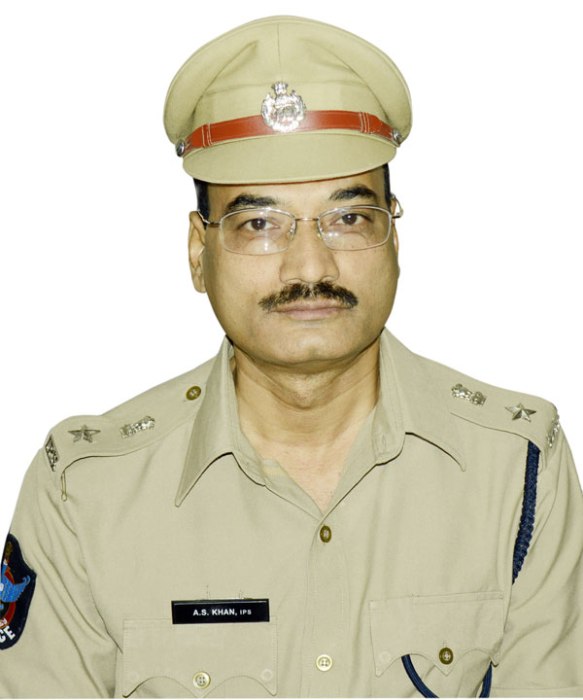
A S Khan supdt of police, srikakulam
11.30 – 11.53 am: Sri A. S. Khan released the “Comprehensive History of Andhra”. Vol.6. He then started talking, “We have to think about some issues. Now, there is a talking that history is useless…….If history is useless, why it should be rewritten? Application of social science themes played havoc in to Indian historiography. There are many questions you have to answer, as I cannot answer, as you only are history writer, whereas, I am only history reader….. History contains some points of speculation….neutrality in historical opinion has been affected…………History is not in the hands of historians now, but, controlled by corporate bodies… now, everything has to be read between the lines…. Past has disappeared from the surface of the earth, because of vandalism and such acts….how conflicts are generated, how arms are created. How weapons moved from one place to another….are to be studied by the historians..Are historians not concerned about these?………….As Gita says discuss about everything, but do not attach towards it…..discuss in cordial atmosphere, at every time. You have come from many places and therefore, it is worthwhile for you to see many important places in and around Srikakulam. I am ready to provide vehicles to see such places.” But, the organizers never bothered about his gesture, and the delegates were ging to places in autos in between the sessions! Coming to his observations, he has made very valid and important, as how “history” is manipulated and controlled!
11.49 am: Dr Chandramouli’’s book was released by Prof Sudarshan RAo, Chairman, ICHR. But, it was announced that only the book would be released and there would not be any discussion or speech about it.

20. Sudharshan Rao speaking
11.54 am- 12.19 pm: Prof. Ellapragada Sudarshana Rao, Chairman, ICHR pointed out that the history of north-east Indian was being neglected. Some Telugu people are writing history differently………… In one book, it is said that all Indian rulers were Telugu……….the objectivity is lacking among historians………(current gone, but, he continued his talk).
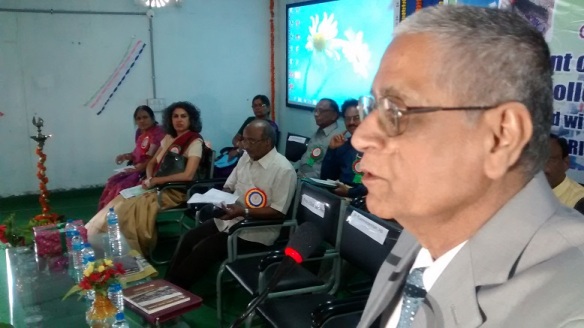
21. Sudharshan Rao speaking – Janaki Nair lookking at
12.13 – 12.19 pm: He continued, “In history writing there should be some ethics. Say, for example, historians should keep their personal conjectures away, instead of presenting facts…..they should be objective in presenting the facts……. APHC has been successful in keeping history…….history need not be linked with nation, but with humanity…….Universal history should be on humanitarian basis… historiography should be about the human development”. That Dr Janaki Nair was attentively listening to him made me interesting, as he was criticized by the leftists for his appointment as the chairman of ICHR. Romila Thapar’s objection has been typical of apartheid or untouchability type exhibited with professional bias[8]. This is what she said about him[9], “He has published popular articles on the historicity of the Indian epics but not in any peer-reviewed journal, and the latter is now a primary requisite for articles to be taken seriously at the academic level”! When the appointments were made during the last 60 years, none questioned, why then, now such hue and cry was made is intriguing. As the historians have openly got divided themselves into different groups, supporting different ideologies, the political appointment would be like that only. So, it looked different when two such opposite poles had to share the same dais, of course, keeping the distance!
12.21 – 2.00 pm: General Secretary presented his report and made some announcements.

24. Medieval section – Krishna reddy chairing

25. Medieval section – Krishna reddy chairing – section of audience
Sectional presidents and their paper-reading: The ritual of paper-reading by the sectional presidents started. The printed booklets of their papers were already given and they would be again printed in the proceedings volume, yet, they had fascination of reading their printed paper faithfully, of course, with the privilege of not allowing any questions or having discussion.
| Sectional Head | Name of the session | Paper presented |
| Dr D. Satyanarayana | Ancient Andhra History and Archaeology | Telelangala charitra puryyugam (Telugu) |
| Prof N. Krisna Reddy | Medieval Andhra History | Epigraphical Studies at Cross Roads |
| Dr G. Bhadru Naik | Modern Andhra History | Rise of Dalit-Bahujan Consciousness in India, 19th and 20th centuries – An overview |
| Dr V. B. T. Sundari | Local History | Srikakulam – In the Annals of History. |
| Dr Janaki Nair | Historiography | No paper given to the delegates, but, “Notes on a Possible “Historical Temper” in Contemporary India” was given to the delegates. |
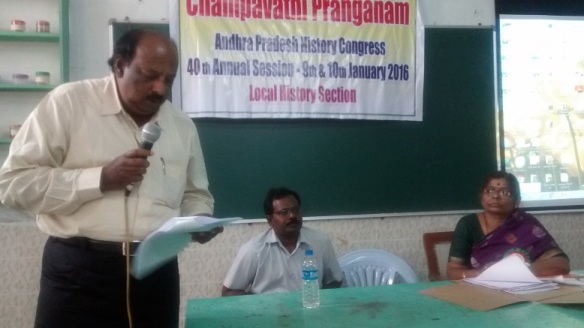
26. Local history section – Madhusudhan rao presenting a paper
Actually, my paper was included in modern, shifted to medieval and finally presented at the Local History section.

27. Local history section – KVR presenting a paper
Mamidipudu Venkatarangaiah Memorial Lecture – 28: The memorial lecture was delivered by Dr Janaki Nair. Her CV can be viewed here[10] and her typical articles appearing in the newspapers are here – about the Tipu controversy[11], defending Wendy doniger’s book[12], criticizing “smart cities”[13]. Her title of the paper was “Notes on a Possible “Historical Temper” in Contemporary India” and it was printed and circulated among the delegates. She started with “scientific temper” to criticize the session of “Ancient Sciences through Sanskrit” of 102nd ISC, delved upon Ghazi Miyan, Tipu Sultan controversy, history writing of the “Akhil Bharatiya Itihas Sankaalan Yojana”, and concluded with Shahid Amin. Her branding of historians as “metropolitan”, “nationalist”, “secular-nationalist” ………categories has been interesting and provoking.
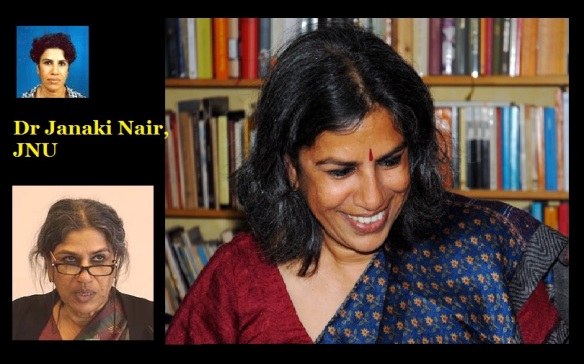
Janaki Nair JNU
The memorial lecture was delivered by Dr Janaki Nair, JNU.
Delegates taking dinner 09-01-2016.
09-01-2016 (Sunday): The second day proceedings were started by 11 am and there were left over papers read in ancient and modern history sections. After lunch, the business session and Valedictory function were held for formality, as only limited strength. Only about 150 delegates got registered for the session. After the conference, the delegates were dropped at the lodges.
I was with friend-delegates.
Entrance of the college – RHS.
Entrance of the college – LHS – posters with various categories – cinema, evangelization, etc.
Ancient history and archaeology section – KVR
Ancient history and archaeology section – Ramakrishna Rao, Harshavardhan etc can be seen.
Ancient history and archaeology section – audience
Again “Balaji Lodge” problem: When I returned to “Balaji Lodge”, I was informed by Sastry at the reception that the organizers had paid only for two days and therefore, I should vacate the room. When I pointed out that the local secretary had accepted my staying back on 10th evening, as my train was only the next day, he insisted that I should vacate the room, as they wanted it. So I contacted Dr Mythili and informed the position. She replied that she had forgotten to mention about my staying back and so she asked me to inform him. I requested that it was better that she should talk with him. The cell phone was handed over to him. I did not know what she told him on the other side, when he handed over the cell phone, it was already disconnected! Again, he insisted to vacate the room. So I asked to give some other room. So he gave single room in the ground floor. Thus, I was accommodated there on 1oth night there at Srikakulam. That was the courtesy extended by her to me in spite of my advance-intimation made about my travel-program.
Why delegates should suffer for the conduct of yearly History conferences?: For attending “two days conference”, it is ridiculous for delegates to travel one and half / two days earlier and later with a lot of inconvenience. And without realizing such inconveniences, it is preposterous to deny accommodation on the second day of the conference. The delegates coming from long distance say from Chennai they had to travel 900 / 1000 kms changing trains. As the conference was held on weekends, that too, on New-year first week coinciding with Christmas and Pongal, it would be very difficult to get railway tickets confirmed for journey. When accommodation was provided one night earlier the conference (08-01-2016), there was no reason for not providing accommodation of the second day (10-01-2016) of the conference. That too, in my case I informed my position two times before coming to Srikakulam and two time after attending conference at the venue and she agreed. But, on 10th evening, I could not find her behaving differently. Anyway, I stayed there and checked out 11th morning to proceed to Samalkot and from there to Chennai by two trains Howrah-Yaswantpura and Circar. Srikakulam has been intriguing and enigmatic city in deed with a lot of mysteries unsolved.

Telengana to return monuments, mss to AP – The Hindu 10-01-2016
Telengana should hand over monuments, manuscripts etc to Andhra: On reaching Chennai on 12th morning, when I searched newspapers and internet, I could see only the following news about APHC as reported by “the Hindu” as local news. APHC urged researches and historians to conduct a deep study into the history of the Kalinga Andhra region which had witnessed major developments in the last few centuries. The forum urged the government to extend its support to historians in collecting details and take up research activity in remote places. The Congress concluded its two-day session in Srikakulam on Sunday (10-01-2016). The committee urged Telangana government to handover all documents, manuscripts and important historical books to AP[14]. APHC on Friday (07-01-2016) asked the Telangana government to hand over all documents, manuscripts and important historical books to Andhra Pradesh to enable it to preserve the rich history of the State[15]. It said future generations need to know the historical background of Andhra Pradesh. The association held its 40th meeting here. As many as 200 delegates from all over of the country would chalk out an action plan to preserve the history of Andhra Pradesh. Founder-member of the Andhra Pradesh History Congress Vakulabharanam Ramakrishna expressed concern over the inordinate delay by the Telangana government in handing over historical monuments and other details to A.P. ICHR will organize a book exhibition as part of the two-day event[16]. “The AP government must take initiative to get back those important documents which would help historians to continue their research,” Ramakrishna added[17].
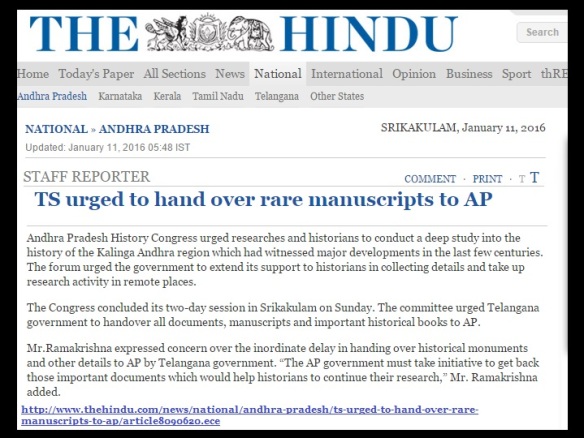
TS urged to hand over rare mss to AP -The Hindu 11-01-2016
Can the factors relating to material and non-material culture, tradition, heritage and civilization be divided?: Indians necer heard of historians demanding Pakistan to hand over all monuments, manuscripts, rare books etc., to India at the time of / after partition. IHC or another history forum never bothered about such idea to get mooted or booted. But, now, among the Telugu speaking people, such things have been happening. Outside “Andhrapradesh”, none could yet see or realize that it has been divided into two states, as many of their relatives and friends have been there. But, why then, history or historians should get divided on this issue demanding the share after partition? Can the factors relating to material and non-material culture, tradition, heritage and civilization be divided and parted away?
[1] Every year, this mistake or blunder is carried on, though I pointed out earlier also.
[2] We, from Chennai have problems in mentioning “Madam” and “Amma” in the context, as it denotes only CM, Jeyalalita. Once, poster appeared all over Chennai, “Viskt of Amma to Chennai” [சென்னைக்கு அம்மா விஜயம் / చెన్నై అమ్మ విజయం] and the AIADMK cadres got wild, as rhey came to know that it was the visit of “Mata Amritananda Mayi” to Chennai!
[3] I met him first at avanigadda session, and he has become my best friend and well-wisher. He used to advise about the mode of travel etc., whenever, I visit AP, as I am not familiar with those details. This time, he virtually accomapanied me or I was with him throughout the travel and also at the session.
[4] Golson, Jack. 1995. “What Went Wrong with WAC 3 and an Attempt to Understand Why”.Australian Archaeology, no. 41. Australian Archaeological Association: 48–54. http://www.jstor.org/stable/40287241.
[5] Here, whether he was referring to India and Pakistan or Andhra and Telengana is subtly revealed.
[6] It is not known as to wher are the “40-50 historians who have come and they are trying to protect” in the context.
[7] Sir Robert Eric Mortimer Wheeler, 5000 years history of Pakistan: An archaeological outline, London, 1950. He was in Pakistan during 1949 and 1950, as an archaeological adviser in Pakistan helping to establish the Archaeological department of Pakistan and National Museum of Pakistan at Karachi. As Pakistan paid him, he faithfully wrote such history for Pakistan!
[8] http://indiatoday.intoday.in/story/romila-thapar-smriti-irani-old-history-baiters-of-bjp/1/370799.html
[9] Romila Thapar, History repeats itself, Guest Column, India Today, July 21, 2014.
[10] Her CV can be seen here – http://www.jnu.ac.in/Faculty/jnair/cv.pdf
[11] About Tipu issue
Janaki Nair, The inconvenience of the past, Updated: October 1, 2015 01:10 IST
http://www.thehindu.com/opinion/op-ed/the-inconvenience-of-the-past/article7707957.ece
Janaki Nair, Why the British commemorate Tipu
Written by Janaki Nair | Published:November 20, 2015 12:00 am
http://indianexpress.com/article/opinion/columns/why-the-british-commemorate-tipu/
[12] Defending the book of Wendy Doniger
http://kafila.org/2014/02/23/terrorized-by-the-past-janaki-nair/
[13] criticizing “smart cities”
Janaki Nair, “The City is History”: New Indian Urbanism and the Terrain of the Law, Südasien-Chronik – South Asia Chronicle 4/2014, S. 165-99.
http://edoc.hu-berlin.de/suedasien/band-4/165/PDF/165.pdf
[14] The Hindu, TS urged to hand over rare manuscripts to AP, by Staff Reporter, January 11, 2016, Updated: January 11, 2016 05:48 IST.
[15] The Hindu, AP to Telengana: return historical documents, K. Srinivasa Rao, January 11, 2016, Updated: January 11, 2016 05:48 IST.
[16] http://www.thehindu.com/todays-paper/tp-national/ap-to-telangana-return-historical-documents/article8086929.ece
[17] http://www.thehindu.com/news/national/andhra-pradesh/ts-urged-to-hand-over-rare-manuscripts-to-ap/article8090620.ece


